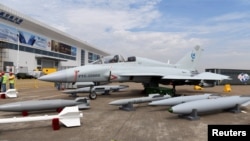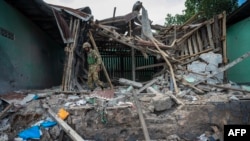Local media in Myanmar are reporting that six FTC-2000G fighter jets purchased from China have arrived, and observers are concerned that Chinese military support for the Myanmar military is prolonging the conflict and worsening civilian suffering.
China's supply of fighter jets, such as the FTC-2000G, has helped the junta maintain air superiority, and that has caused widespread casualties across Myanmar.
According to media reports, this delivery in August 2024 is the second batch of FTC-2000G jets received by Myanmar’s military. The junta took delivery of the first batch in November 2022.
Military-controlled media later showed the FTC-2000G aircraft at a Myanmar Air Force ceremony on Dec. 15, 2022. The second batch is widely expected to be showcased at this year’s Air Force Day celebration in December.
Zay Ya, a former sergeant in the Myanmar Air Force, explained to VOA from an undisclosed location on the Thai-Myanmar border, “Many of the Russian-made Yak-130s are out of service, so the Chinese jets are now critical to the military’s operations."
He added that the Chinese jets are already used in combat, with several stationed at key air bases.
Zay Ya, who served in Myanmar’s Air Force for nearly a decade, deserted the military following the February 2021 overthrow of an elected government and is now assisting fellow former service members who have joined the Civil Disobedience Movement against the military junta.
Based on his hands-on experience with the Myanmar Air Force, Zay Ya pointed out that Russia’s aircraft are high-cost and fuel-consuming, while Chinese planes are more compatible with Myanmar’s existing defense industry. "The Russian-made Sukhoi Su-30 — four of them arrived before the FTC-2000G — but the FTC-2000G can be used immediately," Zay Ya said.
VOA’s Burmese Service contacted the Myanmar government’s military information team in Nay Pyi Taw and the Chinese Embassy in Yangon and Washington, D.C., regarding the delivery of FTC-2000G jets.
Chinese Embassy Spokesperson Mr. Liu Pengyu responded, "I don't know the specific details. China has always adopted a cautious and responsible attitude in the export of military products and dual-use items."
Use of FTC-2000G
The FTC-2000G’s ability to carry missiles, rockets and bombs has significantly enhanced the junta’s airstrike capabilities, particularly in conflict zones like northern Shan State and areas controlled by the Brotherhood Alliance, an ethnic armed group near the Chinese border, according to the observers.
A report by Justice for Myanmar and Info Birmanie highlighted how China's FTC-2000G aircraft have been used for air raids on civilian areas. On Jan. 16, 2024, opposition forces downed an FTC-2000G jet involved in an attack over the Namhpatkar region in northern Shan State. In December 2023, another FTC-2000G jet dropped bombs on residential buildings near Namkham.
‘It will not shift the balance’
Dr. Abdul Rahman Yaacob, an expert on Southeast Asia’s defense and security issues with Lowy Institute, commented on the broader implications of the jet deliveries. “China is clearly taking sides in the civil war,” he told VOA. “It shows that China is not a neutral actor in the Myanmar crisis by supplying arms to the junta."
While the delivery of combat aircraft may give the junta some tactical advantage, Yaacob said, “Overall, it will not shift the balance to the side of the junta. The junta is actually facing a counterinsurgency. An insurgency campaign cannot be dealt with just by air power alone. It has to be fought by foot soldiers. And this is where the junta is facing a major problem — it has a shortage of manpower.”
Several experts believe China’s actions are about more than military support.
Jason Tower, the country director for the Burma program at the United States Institute of Peace, or USIP, told VOA, "It’s very clear that China still sees the Myanmar military as the government of Myanmar, and it seems unlikely that over the short term, China’s posture is going to change."
He argues that the sale of the fighter jets signals China’s intention to maintain stability in Myanmar and convince other international actors to accept the military junta.
Thomas Kean, a senior consultant at the International Crisis Group, said China’s goal is to stabilize Myanmar and protect its strategic interests. "I think China wants stability and a degree of normalization," Kean said. "China is pushing for a deal between the military and ethnic armed groups."
Civilian impact, international calls
The conflict has displaced millions, with the United Nations estimating that more than 2.3 million people have fled their homes since the coup. Bombings have targeted schools, hospitals, and residential areas with little regard for civilian lives, according to the U.N.
The international community has condemned Myanmar’s military for its atrocities. In a statement to the U.N. Human Rights Council, Nicholas Koumjian, head of the Independent Investigative Mechanism for Myanmar, said, "In many instances, civilians are not just collateral damage but the target of attacks, which appear intended to create terror."
Human rights organizations, including Amnesty International and Justice for Myanmar, have called on China to stop arms transfers to the junta.





